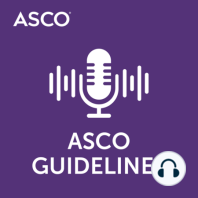27 min listen

Endocrine Treatment and Targeted Therapy for Hormone Receptor-Positive, Human Epidermal Growth Factor Receptor 2-Negative Metastatic Breast Cancer Gui…
FromASCO Guidelines
Endocrine Treatment and Targeted Therapy for Hormone Receptor-Positive, Human Epidermal Growth Factor Receptor 2-Negative Metastatic Breast Cancer Gui…
FromASCO Guidelines
ratings:
Length:
16 minutes
Released:
Jul 29, 2021
Format:
Podcast episode
Description
An interview with Dr. Harold Burstein from Dana Farber Cancer Institute in Boston, MA, chair on “Endocrine Treatment and Targeted Therapy for Hormone Receptor-Positive, HER2-Negative Metastatic Breast Cancer: ASCO Guideline Update.” This guideline updates recommendations on use of alpelisib, and the role of biomarkers and CDK4/6 inhibitors. Read the guideline at asco.org/breast-cancer-guidelines. Suggest a topic for guideline development at surveymonkey.com/r/ascoguidelinesurvey. TRANSCRIPT [MUSIC PLAYING] SPEAKER: The purpose of this podcast is to educate and to inform. This is not a substitute for professional medical care and is not intended for use in the diagnosis or treatment of individual conditions. Guests on this podcast express their own opinions, experience, and conclusions. The mention of any product, service, organization, activity, or therapy should not be construed as an ASCO endorsement. [MUSIC PLAYING] BRITTANY HARVEY: Hello and welcome to the ASCO Guidelines podcast series brought to you by the ASCO Podcast Network, a collection of nine programs covering a range of educational and scientific content and offering enriching insight into the world of cancer care. You can find all the shows, including this one, at podcasts.asco.org. My name is Brittany Harvey. And today I'm interviewing Dr. Harold Burstein from Dana-Farber Cancer Institute in Boston, Massachusetts, chair and lead author on endocrine treatment and targeted therapy for hormone receptor-positive HER2 negative metastatic breast cancer ASCO guideline update. Thank you for being here, Dr. Burstein. HAROLD BURSTEIN: Glad to be with you. BRITTANY HARVEY: First I'd like to note that ASCO takes great care in the development of its guidelines in ensuring that the ASCO conflict of interest policy is followed for each guideline. The full conflict of interest information for this guideline panel is available online with the publication of the guideline in the Journal of Clinical Oncology. Dr. Burstein, do you have any relevant disclosures that are related to this guideline topic? HAROLD BURSTEIN: I do not. BRITTANY HARVEY: Great, thank you. Then let's delve into the content of this guideline. So first, what prompted the update of this guideline and what is the focus of this update? HAROLD BURSTEIN: So this guideline focuses on metastatic breast cancer, and in particular, estrogen receptor-positive HER2 negative metastatic breast cancer. Worldwide in 2021, actually breast cancer became the most commonly diagnosed cancer in the world, excepting superficial skin cancers. And so it is a true global health problem. And the most common type of breast cancer is estrogen receptor-positive HER2 negative breast cancer, which accounts for 70% to 75% of all cancer diagnoses in the breast cancer space, and as a consequence, also accounts for 70% to 75% of the cases of metastatic breast cancer. So it's really important from a public health point of view and a quality point of view, both in the United States and globally, to have current up-to-date guidance for the management of this most common form of breast cancer that we have. In addition, there have been several innovations in the way of targeted therapies that are coming into place for advanced ER-positive breast cancer. And increasingly, we are using genomic tests to help us understand how best to treat patients with advanced ER-positive breast cancer. So those two initiatives-- the interest in genomic testing and the use of targeted therapies-- all warranted and justified an update to the guidelines. BRITTANY HARVEY: Great. Thank you for reviewing that landscape of where we are in clinical practice for this guideline. So then I'd like to review the key recommendations that this guideline addresses. So first, should alpelisib be given to post-menopausal women and to male patients with hormone receptor-positive HER2 negative PIK3CA-mutated advanced or metastatic breast cancer? HAROLD BURSTEIN: So alpelisib, as you in
Released:
Jul 29, 2021
Format:
Podcast episode
Titles in the series (100)
Practical Assessment and Management of Vulnerabilities in Older Patients Guideline: An interview with Dr. Supriya Mohile from University of Rochester on the guideline published in JCO which provides guidance regarding the practical assessment and management of vulnerabilities in older patients undergoing chemotherapy. To read... by ASCO Guidelines